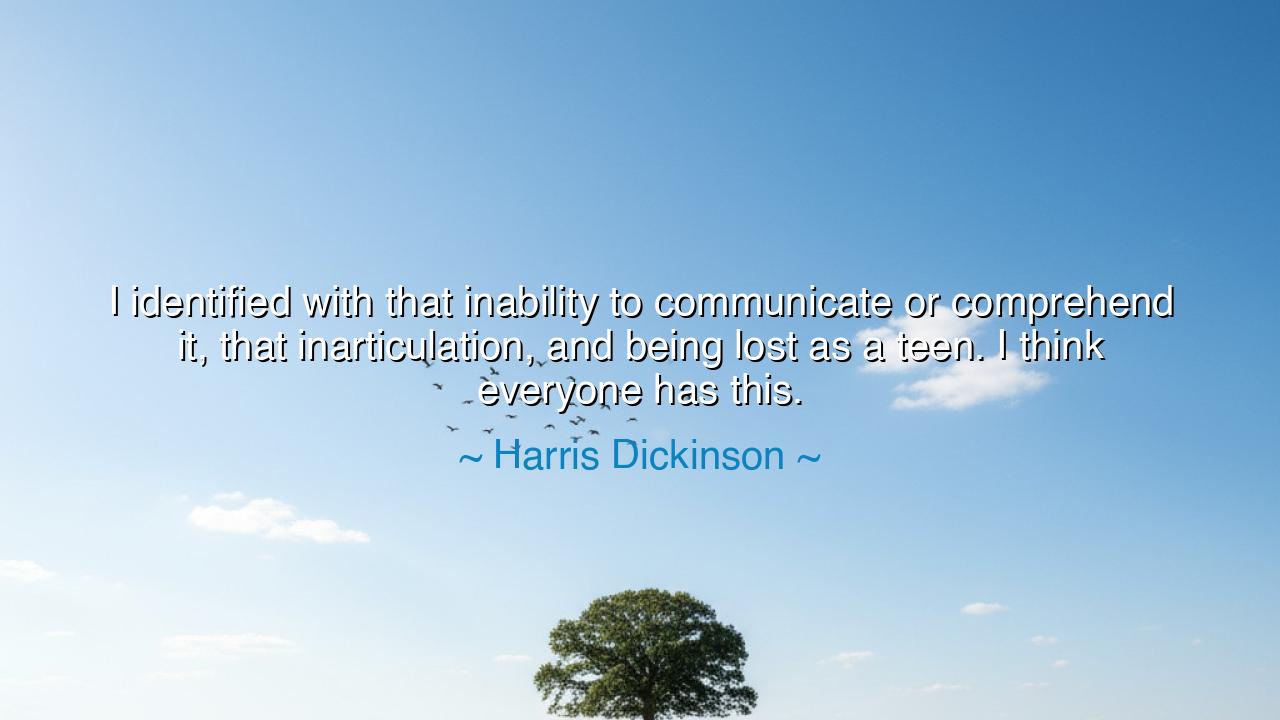
I identified with that inability to communicate or comprehend
I identified with that inability to communicate or comprehend it, that inarticulation, and being lost as a teen. I think everyone has this.






Hearken, O children of the ages, to the reflective words of Harris Dickinson, who speaks of the profound inarticulation and bewilderment that accompany the passage through adolescence. He reflects upon the inability to communicate, the sense of being lost, and the struggle to comprehend oneself and the world in those tender years. In his insight, we perceive a timeless truth: the confusion and silence of youth are universal, shaping the heart and mind in ways that endure, preparing the soul for empathy, wisdom, and self-understanding.
Since the dawn of human society, elders have observed that adolescence is a crucible of both discovery and disorientation. In ancient Greece, the youths of Athens wrestled with the teachings of philosophers, the expectations of society, and the stirrings of passion and desire, often finding themselves lost amidst complexities they could scarcely articulate. Dickinson’s reflection echoes this ancient recognition: the confusion of adolescence is neither shameful nor exceptional—it is the common inheritance of all who pass through the threshold of growing awareness.
Consider the story of Vincent van Gogh, whose early years were marked by emotional turbulence and an inability to fully communicate his inner visions. Though lost and misunderstood, he channeled his inarticulate anguish into art that transcended words, conveying what could not be spoken. Dickinson’s acknowledgment of universal adolescent incomprehension mirrors this principle: when speech fails, creativity, reflection, and observation provide pathways to understanding oneself and connecting with others.
The reflection also illuminates the universality of struggle. Dickinson asserts, “I think everyone has this,” reminding us that the bewilderment, silence, and sense of being adrift are shared human experiences. To recognize this is to cultivate empathy, for one can better perceive the internal storms of others when recalling one’s own moments of inarticulation and loss. The adolescent experience becomes a bridge between self and other, teaching the value of patience, listening, and compassion.
His insight further underscores the necessity of reflection and expression. To be lost, inarticulate, or confused is not merely a condition to endure; it is an opportunity to observe, to contemplate, and to seek forms of communication that transcend conventional language. Just as van Gogh transformed inner turmoil into color and form, so too can the teen—or the adult who remembers adolescence—channel confusion into creative, thoughtful, and meaningful expression.
The lesson is profound: the struggles of adolescence are formative. They teach that uncertainty and silence are not signs of weakness but invitations to deeper understanding. By embracing moments of being lost, reflecting upon them, and seeking expression through art, conversation, or introspection, one cultivates resilience, emotional intelligence, and self-awareness. Dickinson reminds us that this experience is not solitary; it is a shared inheritance of humanity.
Practical guidance emerges from this wisdom. When encountering moments of inarticulation or confusion, honor them rather than fear them. Write, draw, perform, or converse to explore thoughts and feelings, and seek dialogue with trusted mentors or peers. Recognize that the very act of grappling with being lost cultivates clarity, empathy, and understanding that will endure long after the tumult of youth has passed.
Thus, heed the eternal teaching of Harris Dickinson: the adolescent’s bewilderment, the silence and confusion, is both universal and sacred. It shapes character, nurtures empathy, and fosters the creative and reflective capacities of the human spirit. By acknowledging, exploring, and expressing what seems inarticulate, one transforms the tumult of youth into enduring wisdom, and learns that in being lost, one discovers the path toward self-understanding and connection with others.






AAdministratorAdministrator
Welcome, honored guests. Please leave a comment, we will respond soon